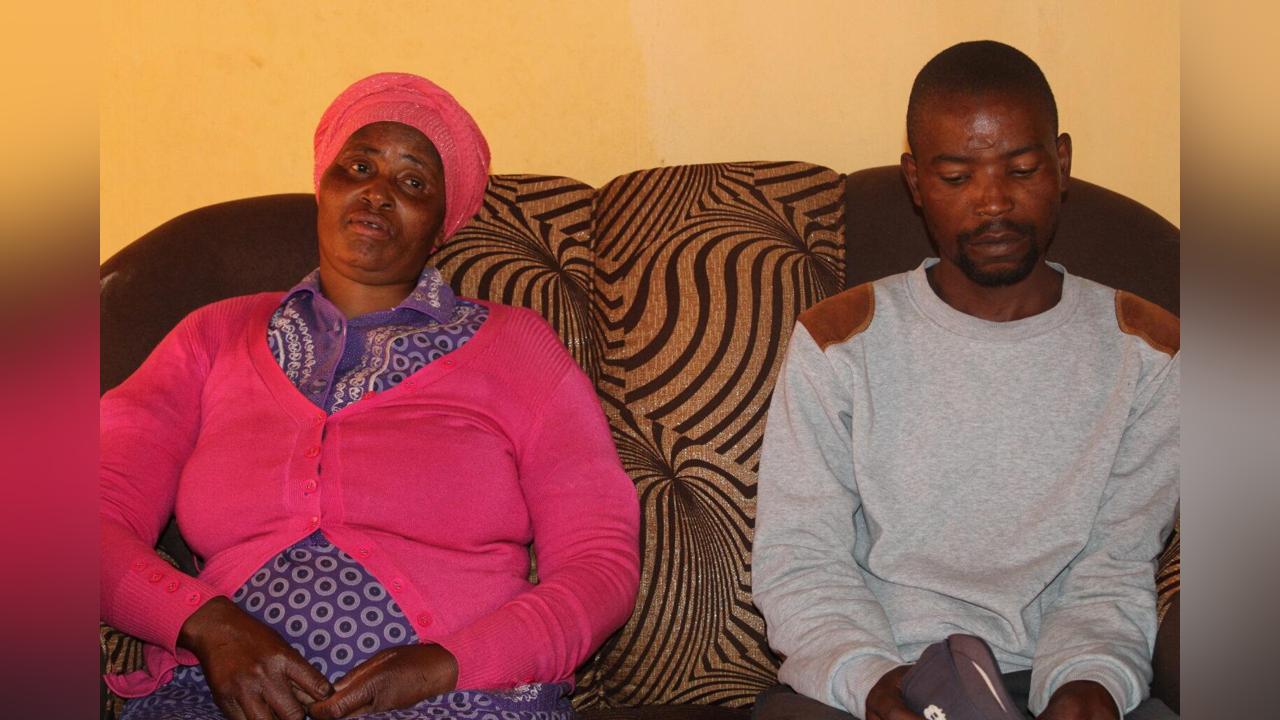Africa-Press – Lesotho. Many questions have arisen over the death of Moleboheng Mothibeli, a Mosotho migrant domestic worker who is among the seven women brutally murdered by a Zimbabwean serial killer in South Africa. The tragedy spotlights the government’s commitment towards combatting trafficking in persons (TIP).
When a Public Eye team visited Moleboheng’s family this week, there was a thick fog of grief at the family residence of the deceased who vanished on October 19 in Polokwane, South Africa, only for her remains to be found on November 11.
On arrival at her Ha Tšosane home the crew met with her grief-stricken husband Modula Ramolula, along with Moleboheng’s mother ’Mapalo Mothibeli and her cousin ’Mannyane Motsamai who were quietly seated trying to come to terms with the loss.
This is the home Moleboheng peacefully shared with her husband and their children before she left the country for South Africa where she was a domestic worker.
As family, friends and neighbours thronged the home, the grief-stricken Ramolula kept repeating that he was still in disbelief over the tragic fate of his wife.
Moleboheng’s maiden family at Sehlabeng sa Thuathe says they are inconsolable and unable to accept the death of their beloved daughter who was brutally killed in South Africa. Moleboheng (34) is reported to have left her place of work on October 19 saying she was “going to the shops and would come back shortly.
” However, she was never heard of again until three weeks later when her body was found amongst seven bodies of women that were discovered dumped in different locations in Seshego, Polokwane, Mankweng and Westerberg.
The family says Moleboheng was the family’s breadwinner and with her death, they feel shattered as they don’t even know how to begin to plan for her funeral since they don’t have the finances to cover it.
Her unemployed husband is unemployed and survives on erratic piece jobs. They are pleading for any kind of help – including transportation of her remains from South Africa to Lesotho, the cost of which is estimated to be around M9 000.
Born at Ha-Ramabanta and raised at Ha-Tšiu, in Maseru, before her family moved to Sehlabeng sa Thuathe, Berea, Molebo, as she was affectionately called by her cousin, has always been a peaceful person who loved to keep peace with those around her.
“Everytime when she was at home she would lift everyone’s spirits,” says her cousin ’Mannyane and, before she could finish her statement the deceased’s mother chipped in saying “when she was at home, Moleboheng would bake for everyone and wanted all of us to visit our relatives at Ha-Ramabanta.
In a very low, sad voice, her husband added that she liked to sing monyanyako, immediately when he said so, the three burst into laughter and all narrated their shared memories with voices full of life as though there was a choir conductor instructing them to start a song.
“She was not a good singer though, she liked to sing,” they all said in unison. For a moment their faces beamed with happiness which they said their beloved late Moleboheng always exuded.
Reminiscing about how her cousin loved to work hard and loved beautiful things, ’Mannyane said “she loved nice and beautiful things, even in her house there is a lot of beautiful stuff. She was a hard worker and had great plans for her family; she loved her husband and had plans on how they would develop their family wealth together.
” ’Mannyane said while at work in South Africa Moleboheng had learned to produce hand sanitisers, liquid soaps and toilet cleaning soaps, and that her plan was to start her own family business with her husband.
The devastated husband of the deceased said he feels helpless and upset because not a day would pass by without him communicating with his wife. “We used to communicate many times a day and she would often tell me what she is up to; we always shared our plans for each day,” Ramolula said with a sad voice.
Ramolula said he and his wife were very close and always called each other by pet names. “The last day we spoke was on October 19 when I texted her greetings as we usually do but it ended there as there was no response.
Usually I know around lunch time she would tell me about her plans but that day she didn’t. I texted her again but she did not respond. From there onwards, my messages never went through until bedtime,” Ramolula narrated.
Ramolula said the following day he received a call from Moleboheng’s father, Ntoa Mothibeli, who informed him that there was a rumour that Moleboheng had disappeared.
Asked what came to his mind when he learned about the disappearance of her wife, with a shaky voice he said, “I was worried even more now, I’m just pulling myself together for the sake of our children and because I am a man. I wasn’t expecting this kind of sad news. I thought maybe she had gone somewhere for a piece job and would be back.
” Ramolula said they had agreed with her wife that he would track her phone with a tracker app so he was able to assist the South African Police Services (SAPS) with tracking Moleboheng’s phone when he went South Africa looking for his wife.
According to the family, when Moleboheng left the home where she worked, she told her employer’s daughter-in-law that she was going to the shops and would be back shortly. That that was the last time she was seen.
While everybody expected her to come back, her family says she sent messages to her employer’s daughter-in-law whom she had left at home asking for R200, claiming that she has been kidnapped.
Her mother said she learned that her daughter sent the same message to her friend (Moleboheng’s friend) who also works in Polokwane as a domestic worker and is originally from Matsieng. Moleboheng and her husband were blessed with five children – four girls aged 16, 14, 12 and one year and four months, plus a nine-year-old boy.
Another Mosotho woman who is a domestic worker in South Africa, ’Mamolemo Semanama, told Public Eye in a separate interview this week that domestic workers from Lesotho have since formed a group to assist each other following the death of Moleboheng.
Although they have not yet decided on the name to identify themselves in the country, they have tentatively agreed to call their team ‘Bo-‘M’e ba Thuathe’.
The group of female migrant domestic workers have agreed to form an association which is going to help Basotho women working in South Africa as domestic workers to strive to achieve decent working conditions and social justice.
She said the aim is to assist each other meaningfully by exchanging ideas on best practices for domestic workers and to create a platform for them to be recognised.
Semanama said the group will give them a voice in the public space and facilitate balanced and effective peer and employer review within the industry by having a consolidated and up-to-date database of domestic workers.
The group, she said, decided to be named after the place Thuathe in honour and remembrance Moleboheng and the tragic consequences of the exploitation of Basotho domestic workers in South Africa.
Semanama added that it is only through their leadership and creativity as domestic workers experiencing abuse, exploitation and trafficking that all will be encouraged to break the silence and come forward.
She added that they are going to ensure that they help each other live in a place where there is much needed security and support during tough times, especially when they get sick or get fired from their respective jobs. The association will assist such individuals to come back home to their families, she said.
“Despite our important role, domestic workers are among the most exploited and abused workers in the world,” she said, adding the main challenges include exposure to abuse, which results in difficulty to be recognised and to be remunerated fairly.
She appealed to the government of Lesotho and partners to extend protection of the labour laws to domestic workers, including rights to a just wage, overtime pay, weekly rest day which she said they hope would reduce their vulnerability at work.
Commenting on the incident, Eriko Nishimura, from the International Organisation for Migration (IOM) Lesotho said issues around human trafficking should be dealt with seriously.
“Whether it is a Mosotho or any national, whether if it is female or male, adult or child, this kind of murder is not acceptable anywhere in the world.
. and we must fight against human trafficking.
The killing of an innocent mother looking for a job opportunity to provide for their family back home in Lesotho – is totally unacceptable and we are in a deep sorrow to hear this horrible story,” she said.
She said her office oversees migration issues – especially in South Africa, and has also partnered with Basotho Diaspora Association (BDA) which has a network with various grassroots associations such as Basotho Domestic Workers Association composed of around 200 domestic workers in the Gauteng region.
“Usually, we have different stories and activities to fight against TIP,’ she said, pointing at ‘lack of employment opportunities in Lesotho’ which remains the root cause of many human trafficking cases in the country.
The IOM also supports skills training to the youth, returned migrants and others in order to build their resilience and their livelihood in Lesotho. “We don’t want to see many youth going to South Africa or anywhere outside the country out of desperation and become Victim of Human Trafficking,” she concluded.
On the other hand, the United States of America (US) Embassy in Maseru has told this publication that they were deeply saddened to learn of the deaths of seven women in South Africa – including a Lesotho citizen – who are allegedly victims of human trafficking.
“Combating trafficking in persons is a top priority for the United States government, and US Embassy in Maseru continues to partner with the government of Lesotho to comprehensively address human trafficking, including the underlying socio-economic vulnerabilities that traffickers prey on,” Jasmine White, the embassy Public Affairs Officer said.
“As the Minister of Home Affairs, Motlalentoa Letsosa, stated during our bilateral dialogue on November 8 ‘strides have been taken and continue to be taken at all levels of government ministries and [with] key stakeholders towards prevention, protection, prosecution, and partnership’ to eliminate trafficking in persons,” White added.
In addition to high-level engagement, the US government currently supports anti-trafficking programming in Lesotho to increase community awareness of human trafficking; bolsters transit monitoring and interception; protect potential or identified victims of trafficking with services; support investigations that can lead to the prosecution of traffickers; and train criminal justice personnel.
For More News And Analysis About Lesotho Follow Africa-Press






